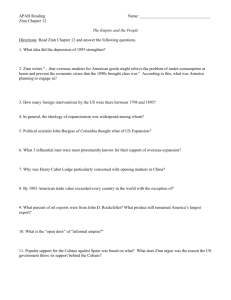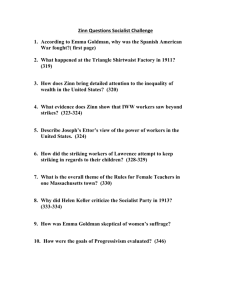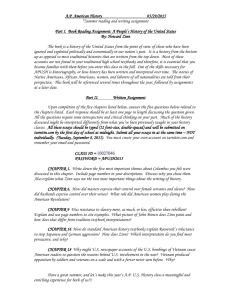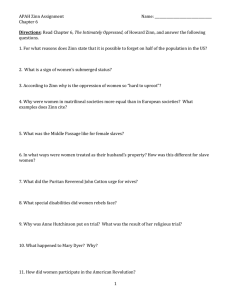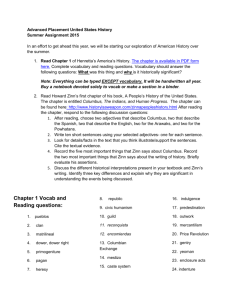US Imperialism: Empire and People Presentation
advertisement
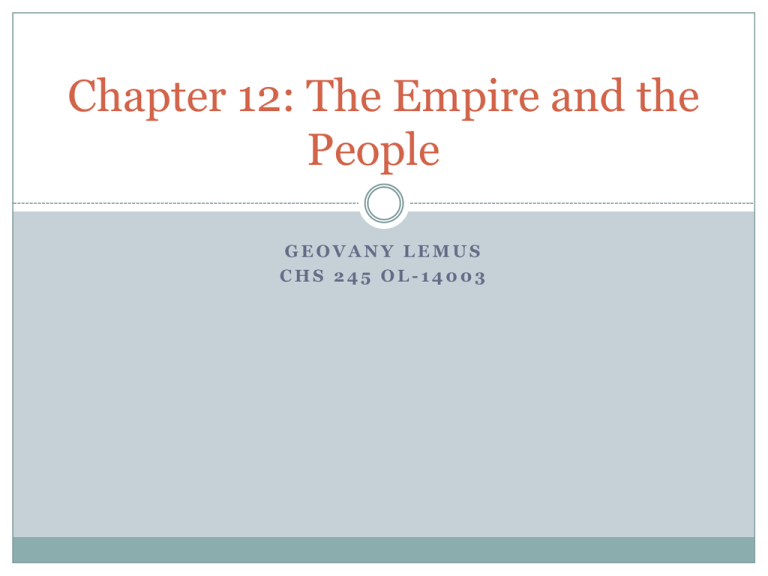
Chapter 12: The Empire and the People GEOVANY LEMUS CHS 245 OL-14003 Introduction Chapter 12, The Empire and the People, unfolds how power hungry the United States was from the 1850’s to the early 1900’s. The United States was a country of imperialism, and wanted to expand its horizons through the military. Imperialism Definition: a policy of extending a country's power and influence through diplomacy or military force. The United States was pushing to be a “Super Power country” (Zinn). America used and abused its military to come to an agreement with other countries. Expansion With a drastic economic depression in 1893, the United States wanted to start expanding. With overseas trade, there was room for economic growth which was huge during this era. America only had itself at the time, so if they expanded their relations with other countries, it would help them in their favor. The types of Americans that pushed for overseas expansion were “in the upper circles of military men, politicians, and businessmen” (Zinn). All Wars Welcome The United States wanted expansion overseas to broaden their options of trade. The easiest way was to start/accept all incoming war offers to create a spike in the economy. The 26th president, Theodore Roosevelt, said “In the strict confidence… I should welcome almost any war, for I think this country needs one” (Zinn). The intention for war was for economic growth and resources for trade. Philippine War After the U.S. helped the Philippines from getting their independence from Spain, America had the intention that they owned the Philippines. This soon led to allegations and disagreements between America and the Philippines. In 1899, the Philippines rose and revolted against the US. “For the Filipinos the death rate was enormous from battle casualties and from disease” (Zinn). The U.S. military decided to wipe them out in order to make a statement and take over this land as their own. Post Philippine War As the United States was seen as a nation superior to the rest, President McKinley decided to spread some of the goods to the Philippines. “There was nothing left to do but to take them all and to educate the Filipinos, and uplift and civilize, and Christianize them-McKinley” (Zinn 313). Not only did they leave them with nothing, they then stripped them from their religion. As Imperialism Increased So Did Racism As power arose in America, land owners were becoming more abusive towards their slaves. “It was a time of intense racism in the United States. In the years between 1889 and 1903, on the average, every week, two Negroes were lynched by mobs -hanged, burned, mutilated” (Zinn). The Spanish-American War America did not want to intervene with war the Cubans had with the Spanish. But, the Spanish were not letting the U.S. expand to Cuba. The U.S. did not like this and joined on the fight which led to Cuba’s independence. Now that the U.S. helped them, they had control of Cuba for a while. “The Spanish-American War was but an incident of a general movement of expansion which had its roots in the changed environment of an industrial capacity far beyond our domestic powers of consumption” (Zinn). Annexation of Hawaii Hawaii was always an interest for the U.S. since it was an island close to Europe. In 1893, the United States annexed/ took over a part of Hawaii to “protect the American lives and property” (Zinn). Although that sounds reasonable, it was more to control the Hawaiian islands before another country would. Economic Growth Foreign trade was a huge factor to the growth in the economy. As America invaded Cuba for “American Interests” , the interests were of economy and commerce. It was all a big business as the US began to sail the waters of other countries. As more than enough money was being produced, it still wasn’t enough. The hunger for power was always an idea and was a goal that was trying to be reached. War within a War The notion that Americans were making money, and everyone was getting their cut seems exact. But there was a huge group of people that weren’t benefitting at all. Work conditions were not great, and Laborers were the ones in the suck. “Wages and employment increased, but only so much as inflation did” (Zinn). Laborers started to rebel and protest but they weren’t being noticed by the government. Dates of binged Imperialism 1852 American lands in Argentina 1853 American lands in Nicaragua 1859 America lands in China 1893 America lands in Hawaii Un-targetable The reason I see behind expansion, and invading other countries, was for the U.S. to soon become un-targetable. Yes economic growth was also a factor. But to own land where isn’t attached the U.S. made the country that much harder to target in a war. Although the American militia were getting involved in a lot of wars that were surrounding them, they never were targeted. For example, today, it is hard for a country to send jets through the pacific because of the naval station in Hawaii. Conclusion Furthermore, the United States has gone through a lot of wars in other countries to help declare their Independence. But, that wasn’t their only intention. By doing that, insured a spike in the economy, and naval stations at that country. America was on a hunt for maximum power at this time. There was never enough power or money to feed the government. At that point they were never satisfied with what they accomplished the day before. Works Cited Zinn, Howard. A People's History of the United States: 1492-2001. N.p.: n.p., n.d. Print.
